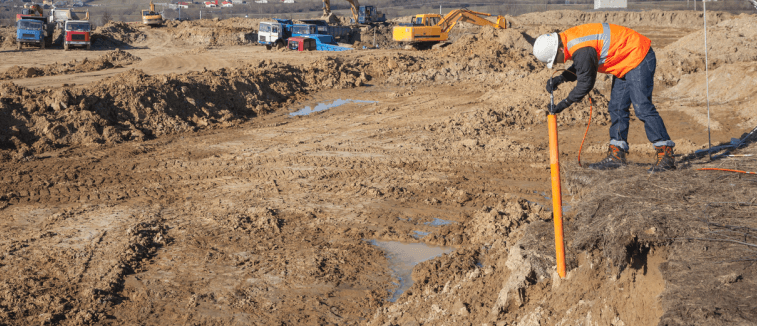Leading Geotechnical Engineers for Cutting-Edge Soil Evaluation and Foundation Design
Leading Geotechnical Engineers for Cutting-Edge Soil Evaluation and Foundation Design
Blog Article
The Interdisciplinary Approaches in the Geotechnical Industry: Connecting the Gap In Between Engineering, Geology, and Environmental Scientific Research for Optimum Job End Results
The integration of design, geology, and environmental scientific research within the geotechnical market is not simply helpful; it is essential for achieving optimal project outcomes. What strategies might arise to facilitate this vital collaboration and enhance the efficacy of geotechnical techniques?
Relevance of Interdisciplinary Collaboration
The relevance of interdisciplinary cooperation in the geotechnical sector can not be overstated. Efficient geotechnical tasks need the assimilation of diverse competence from different fields, consisting of engineering, geology, and environmental scientific research. This cooperation guarantees that all facets of a task are taken into consideration, bring about detailed options that resolve complex obstacles.
When functioning in isolation,Interdisciplinary cooperation promotes technology by enabling specialists to share understandings and techniques that may not be obvious. By leveraging the strengths of numerous disciplines, groups can determine potential risks, maximize design procedures, and enhance the sustainability of geotechnical projects. Such cooperation advertises an alternative understanding of site-specific problems, which is important for precise assessment and decision-making.
The intricacy of geotechnical projects necessitates a collaborated method to analytic. When engineers, geologists, and ecological scientists collaborate, they can produce a natural method that straightens technological needs with ecological considerations and regulatory conformity. This synergy not only enhances job results but also contributes to the lasting durability of facilities. Eventually, interdisciplinary cooperation is essential for progressing best practices and accomplishing quality in the geotechnical sector.
Secret Duties of Each Self-control
Cooperation among numerous techniques is not just useful; it is essential for the successful execution of geotechnical jobs. Each discipline-- design, geology, and ecological scientific research-- plays a distinctive yet interconnected duty that contributes to forecast efficiency and sustainability.
Geotechnical engineers are largely accountable for making foundations and making sure architectural honesty. They analyze dirt and rock properties to evaluate load-bearing abilities, providing important information for secure construction methods. Their expertise enables the formulation of cutting-edge remedies to complicated difficulties.

Ecological scientists assess the possible influences of building on ecological communities and water resources. They carry out ecological analyses and develop mitigation approaches to decrease negative impacts. By integrating ecological considerations, they make sure compliance with regulations and advertise sustainability throughout the task lifecycle.
Study of Successful Combination
Effective assimilation of geotechnical disciplines can be exhibited through numerous study that highlight the efficiency of synergy in dealing with complicated engineering obstacles. One significant example is the building and construction of the Hong Kong-- Zhuhai-- Macau Bridge, where a joint method involving geotechnical engineering, geology, and ecological science was vital. Engineers and geologists functioned in unison to evaluate the seabed conditions and maximize the structure style, guaranteeing security and lessening environmental influence.
Another impactful situation is the improvement of slope security in the San Francisco Bay Area, where an interdisciplinary group combined geotechnical evaluation with ecological analyses. By incorporating geological surveys and hydrological researches, the group effectively identified possible landslide risks and executed effective mitigation actions, boosting security and sustainability.
Moreover, the redevelopment of Brownfield websites typically calls for a multidisciplinary technique. In one instance in Chicago, cooperation among geotechnical designers, ecological scientists, and urban coordinators led to the successful removal of polluted dirt, enabling for the risk-free improvement of the site into a neighborhood park. These study highlight that interdisciplinary collaboration not only addresses technical challenges but also cultivates cutting-edge solutions that profit both projects and communities.
Challenges in Multidisciplinary Projects

Additionally, collaborating routines and process amongst different teams can be problematic, especially when each self-control has one-of-a-kind task landmarks and deliverables. This misalignment can lead to delays and boosted costs. The obstacle of source allocation likewise impends big; making sure that specialized competence is available at vital junctures calls for mindful preparation and insight.
Last but not least, regulative compliance postures an additional significant difficulty. Each discipline might face various regulatory frameworks, and aligning these requirements to meet job purposes can be complex and lengthy. you can check here Resolving these obstacles requires strong leadership and efficient interaction approaches to promote cooperation and go to this web-site ensure that multidisciplinary teams work cohesively in the direction of shared objectives.
Future Trends in Geotechnical Practices
As the geotechnical industry advances, emerging trends are reshaping techniques to attend to the obstacles faced in multidisciplinary projects - consulting engineer. One substantial fad is the boosted combination of advanced innovations, such as expert system and maker discovering, into geotechnical evaluation and design. These modern technologies enhance anticipating modeling and threat analysis, allowing engineers to make even more enlightened decisions throughout the job lifecycle

Furthermore, the adoption of electronic doubles and real-time surveillance systems is ending up being much more prevalent. These tools help with continuous analysis of dirt problems and architectural efficiency, permitting for timely interventions when problems emerge.
Final Thought
In final thought, the combination of design, geology, and ecological science is crucial for attaining ideal outcomes in the geotechnical market. Successful instance research studies highlight the benefits of this strategy, while acknowledging the obstacles encountered in multidisciplinary projects.
The assimilation of engineering, geology, and ecological science within the geotechnical sector is not just useful; it is critical for achieving optimum task end results. Efficient geotechnical projects require the integration link of diverse expertise from different fields, consisting of engineering, geology, and ecological scientific research.Navigating the complexities of multidisciplinary projects in the geotechnical sector presents several substantial difficulties.As the geotechnical market evolves, emerging patterns are improving methods to attend to the challenges encountered in multidisciplinary tasks. Geotechnical engineers are progressively working together with ecological researchers to make certain that jobs straighten with sustainability objectives and comply with regulative demands.
Report this page